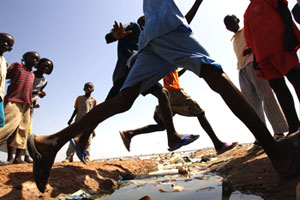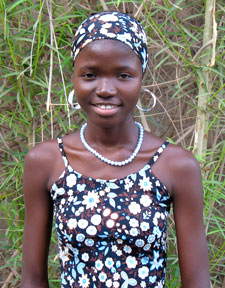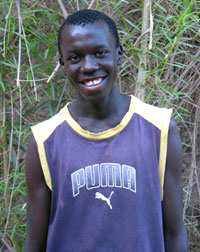News
Reading, Writing, and HIV: When Reproductive Health Becomes Part of the Curriculum
- 05 February 2008
News
KOLDA, Senegal — “Monsieur! Monsieur!” Fingers snapping, faces eager, the students in this small classroom in rural Senegal battle between their desire to follow the strict rules of the classroom and the sheer joy of knowing the answer. The conflict lasts about a second, with propriety losing badly. Many of the students are half-leaping out of their seats by the time the teacher points towards one of his pupils for a description of the image he has hung on the blackboard.

“Well? What’s happening in this picture?”
“The girl is saying to him, ‘I do not have sexual relations without a condom.’”
Just another school day in Senegal.
|
" We focus on abstinence, but with the understanding that people are also human, that some make mistakes, and that we need to look after the health of those that do."
--Dr. Cheikh Ba
|
These students are typical of their peers nationwide as part of a national sexual education curriculum, developed by the Senegalese government and UNFPA, the United Nations Population Fund. The courses in sexual and reproductive health, or Education in Family Life as they are officially called, have become as integrated into the typical school year as mathematics. Every Senegalese public school student must take them, beginning in primary school and continuing through to the final levels of high school.
Breaking a social taboo
Ninety-five per cent of this West African nation’s population is Muslim, and sex remains a taboo subject in many homes. This can make talking about issues like sexually transmitted infections a difficult proposition. The national curriculum breaks the social taboo by making such conversations an obligatory part of going to school.
“This is a Muslim country, and Islam forbids sex before marriage,” explains Dr. Cheikh Ba, the head of UNFPA’s office in Kolda. “So we focus on abstinence, but with the understanding that people are also human, that some make mistakes, and that we need to look after the health of those that do.”

The Government’s early, consistent and multisectoral actions to prevent the spread of HIV has garnered international attention and helped maintain Senegal’s very low infection rate: less than 1 per cent of the population is HIV-positive. Education ha been an important part of the country's response.
Afterschool raps and movies about serious issues
Extracurricular Education in Family Life clubs are run by the Group for the Teaching and Study of Population Issues, a UNFPA-supported Senegalese NGO. The clubs are student-run and voluntary. Members meet after school or during free periods to discuss issues ranging from female genital mutilation/cutting to HIV to early pregnancy.
Persuading teenagers to give up free time might seem like a tricky proposal, but the clubs have their own ways of drawing interest. Safietou Baldé, 17, was first attracted by the informational movies offered, which have proven popular with students. Safietou was eventually elected president of her club and smiles with pride when talking about the first event of her tenure.
“We organized a film screening on early pregnancy, and the room was full!”
Cheikh Tidiane is 15 years old and also a club president. He and his friends are serious hip-hop fans and mobilize their collective talents to cobble together raps about HIV and AIDS with the aim of sparking discussion. If faced with a recalcitrant student -- someone who ought to come to the club but doesn’t want to --Tidiane tells him, “This will teach you how to lead your family.”

Besides providing students with a relaxed setting to talk about these often-sensitive issues, the clubs have a visible impact on the local community, creating what is effectively a young civil society. In the last few months, students from Safietou and Cheikh’s clubs have organized an HIV/AIDS-awareness march and a day of free HIV testing and counselling.
Taking a stand on early marriage
Students in Sedhiou, a town near Kolda, learned that one of their classmates was being pressured into an early marriage. They held a protest march, after which the parents relented. The girl now remains unmarried and free to pursue her studies.
Nevertheless, programmes such as these have not changed Senegalese culture completely. With sex before marriage contrary to religious custom, condoms have not yet lost their stigma. One club member described picking some up at a local health centre, then coming home and hiding them so no one would find out.
Yet he tells this story with a laugh, for he is at school now, and he has no reason to hide anything here. Across the country, Senegal’s next generation is being educated in the same spirit of openness, paving the way for what will hopefully be a healthier future for all.
— Arthur Plews